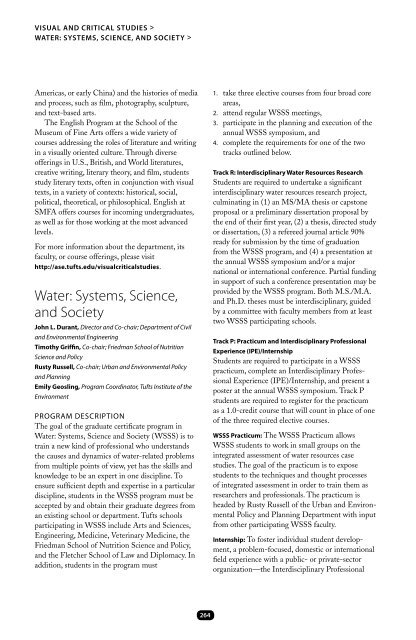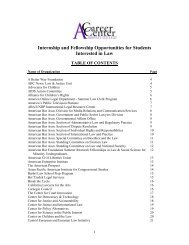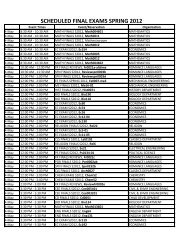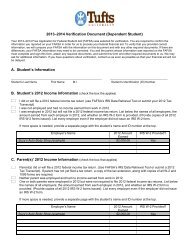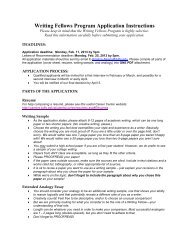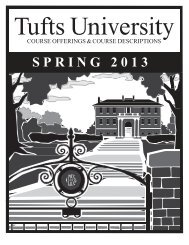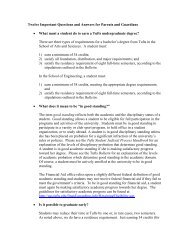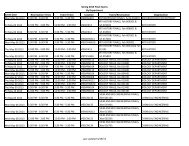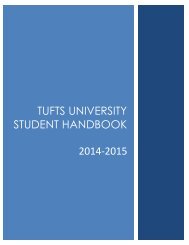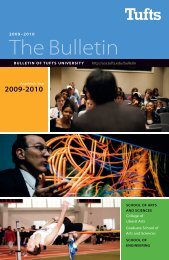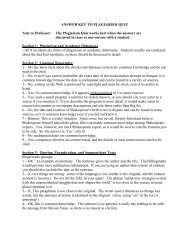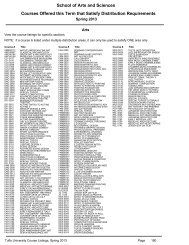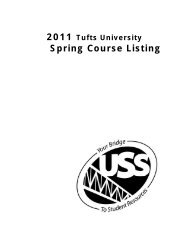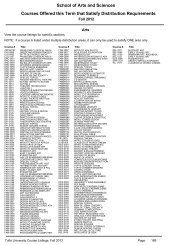2013â2014 The Bulletin - USS at Tufts - Tufts University
2013â2014 The Bulletin - USS at Tufts - Tufts University
2013â2014 The Bulletin - USS at Tufts - Tufts University
You also want an ePaper? Increase the reach of your titles
YUMPU automatically turns print PDFs into web optimized ePapers that Google loves.
Visual and Critical Studies ><br />
W<strong>at</strong>er: Systems, Science, and Society ><br />
Americas, or early China) and the histories of media<br />
and process, such as film, photography, sculpture,<br />
and text-based arts.<br />
<strong>The</strong> English Program <strong>at</strong> the School of the<br />
Museum of Fine Arts offers a wide variety of<br />
courses addressing the roles of liter<strong>at</strong>ure and writing<br />
in a visually oriented culture. Through diverse<br />
offerings in U.S., British, and World liter<strong>at</strong>ures,<br />
cre<strong>at</strong>ive writing, literary theory, and film, students<br />
study literary texts, often in conjunction with visual<br />
texts, in a variety of contexts: historical, social,<br />
political, theoretical, or philosophical. English <strong>at</strong><br />
SMFA offers courses for incoming undergradu<strong>at</strong>es,<br />
as well as for those working <strong>at</strong> the most advanced<br />
levels.<br />
For more inform<strong>at</strong>ion about the department, its<br />
faculty, or course offerings, please visit<br />
http://ase.tufts.edu/visualcriticalstudies.<br />
W<strong>at</strong>er: Systems, Science,<br />
and Society<br />
John L. Durant, Director and Co-chair; Department of Civil<br />
and Environmental Engineering<br />
Timothy Griffin, Co-chair; Friedman School of Nutrition<br />
Science and Policy<br />
Rusty Russell, Co-chair; Urban and Environmental Policy<br />
and Planning<br />
Emily Geosling, Program Coordin<strong>at</strong>or, <strong>Tufts</strong> Institute of the<br />
Environment<br />
PROGRAM DESCRIPTION<br />
<strong>The</strong> goal of the gradu<strong>at</strong>e certific<strong>at</strong>e program in<br />
W<strong>at</strong>er: Systems, Science and Society (WSSS) is to<br />
train a new kind of professional who understands<br />
the causes and dynamics of w<strong>at</strong>er-rel<strong>at</strong>ed problems<br />
from multiple points of view, yet has the skills and<br />
knowledge to be an expert in one discipline. To<br />
ensure sufficient depth and expertise in a particular<br />
discipline, students in the WSSS program must be<br />
accepted by and obtain their gradu<strong>at</strong>e degrees from<br />
an existing school or department. <strong>Tufts</strong> schools<br />
particip<strong>at</strong>ing in WSSS include Arts and Sciences,<br />
Engineering, Medicine, Veterinary Medicine, the<br />
Friedman School of Nutrition Science and Policy,<br />
and the Fletcher School of Law and Diplomacy. In<br />
addition, students in the program must<br />
1. take three elective courses from four broad core<br />
areas,<br />
2. <strong>at</strong>tend regular WSSS meetings,<br />
3. particip<strong>at</strong>e in the planning and execution of the<br />
annual WSSS symposium, and<br />
4. complete the requirements for one of the two<br />
tracks outlined below.<br />
Track R: Interdisciplinary W<strong>at</strong>er Resources Research<br />
Students are required to undertake a significant<br />
interdisciplinary w<strong>at</strong>er resources research project,<br />
culmin<strong>at</strong>ing in (1) an MS/MA thesis or capstone<br />
proposal or a preliminary dissert<strong>at</strong>ion proposal by<br />
the end of their first year, (2) a thesis, directed study<br />
or dissert<strong>at</strong>ion, (3) a refereed journal article 90%<br />
ready for submission by the time of gradu<strong>at</strong>ion<br />
from the WSSS program, and (4) a present<strong>at</strong>ion <strong>at</strong><br />
the annual WSSS symposium and/or a major<br />
n<strong>at</strong>ional or intern<strong>at</strong>ional conference. Partial funding<br />
in support of such a conference present<strong>at</strong>ion may be<br />
provided by the WSSS program. Both M.S./M.A.<br />
and Ph.D. theses must be interdisciplinary, guided<br />
by a committee with faculty members from <strong>at</strong> least<br />
two WSSS particip<strong>at</strong>ing schools.<br />
Track P: Practicum and Interdisciplinary Professional<br />
Experience (IPE)/Internship<br />
Students are required to particip<strong>at</strong>e in a WSSS<br />
practicum, complete an Interdisciplinary Professional<br />
Experience (IPE)/Internship, and present a<br />
poster <strong>at</strong> the annual WSSS symposium. Track P<br />
students are required to register for the practicum<br />
as a 1.0-credit course th<strong>at</strong> will count in place of one<br />
of the three required elective courses.<br />
WSSS Practicum: <strong>The</strong> WSSS Practicum allows<br />
WSSS students to work in small groups on the<br />
integr<strong>at</strong>ed assessment of w<strong>at</strong>er resources case<br />
studies. <strong>The</strong> goal of the practicum is to expose<br />
students to the techniques and thought processes<br />
of integr<strong>at</strong>ed assessment in order to train them as<br />
researchers and professionals. <strong>The</strong> practicum is<br />
headed by Rusty Russell of the Urban and Environmental<br />
Policy and Planning Department with input<br />
from other particip<strong>at</strong>ing WSSS faculty.<br />
Internship: To foster individual student development,<br />
a problem-focused, domestic or intern<strong>at</strong>ional<br />
field experience with a public- or priv<strong>at</strong>e-sector<br />
organiz<strong>at</strong>ion—the Interdisciplinary Professional<br />
264


